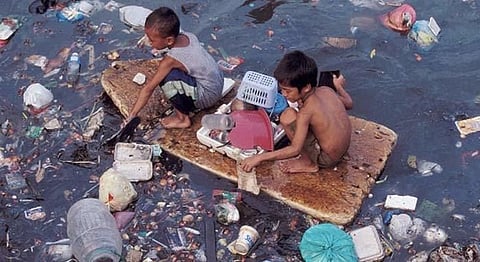
- HOMEGROWN WORLD
- #HGCREATORS
- #HGEXPLORE
- #HGVOICES
- #HGSHOP
- CAREERS
- ABOUT US
- CONTACT US

It’s a sad fact that seeing whale and dolphins wash ashore has now become a regular occurrence the world over. While in several cases disease and natural causes have led to such beachings, there is an underlying common denominator in many of these, and it is that our marine life is facing the consequences of human waste dumping.
Our water bodies are choking with chemical and plastic waste that gets irresponsibly disposed off through regular dumping. This oceanic degradation is a major factor in climate change, and unfortunately, not enough people care about it to actually make a major change. In our capitalist world money is the name of the game, and this may have been driving factor that led Swaminathan Ramesh to create the technology that is being used in a mobile reactor which converts waste plastic into fuel. “Using our efficient Plastic to Fuel (PTF) conversion units, we are hoping to address the problems of plastic pollution on land and the ocean,” the Indian-born chemist told IANS. A graduate of the Indian Institute of Science (IISc) in Bengaluru and President of Michigan-based EcoFuel Technologies, Ramesh’s company developed the technology working with James Holm, founder of Clean Oceans International, and they’re now preparing to showcase their work in a demonstration project in California.
They stated their goal to be ridding the world of plastic waste by creating a market for it, and fuel is probably the largest and most in-demand one across all countries. In a statement regarding the upcoming demonstration, the American Chemical Society said, “If we can get people around the world to pick this up and use it to shift waste plastics to fuel and make money, we can even eliminate plastic waste before it gets to the oceans by creating value for it locally on a global basis.”
As reported by Financial Express, the technology that breaks down the plastic into hydrocarbon-based fuel has existed for years, but required further study and costly refining steps to make it actually useable - this is exactly what Ramesh and his colleagues have set out to do. Moreover, this reactor is mobile, so the stress of transporting the plastic is negated and it’s even said to be cost-effective on a small scale.“Our process — catalytic thermal depolymerisation technology — is by catalytic pyrolysis and, by careful management of heat transfer and reaction kinetics, we have optimised the yields to be around 90 per cent of the desired fuel,” Ramesh explains in the report.
Ramesh commented that India has shown little interest in his technology so far - he admits that he hasn’t pushed hard enough - but considering that we dump approximately 0.6 tonnes of plastic waste into ocean annually and are high on the list of ocean polluters, this is definitely the need of the hour. The time is now to take steps towards living sustainably, taking responsibility and cleaning up the tremendous mess we have turned our natural surroundings into.
Click here to read the in-depth report by Financial Express
Representational feature image via Start Some Good
